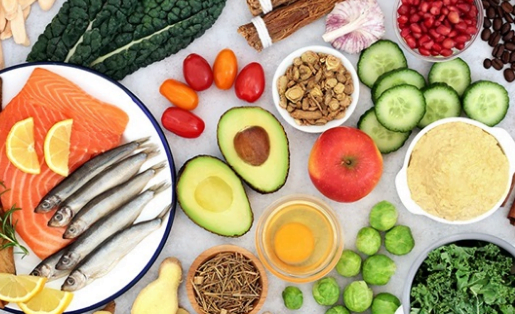Anti Inflammatory Foods: The Key to a Healthy Lifestyle


Introduction
Inflammation is a natural response of the body to protect itself from harm and facilitate the healing process. However, chronic inflammation can lead to various health issues, including heart disease, arthritis, and even cancer. Fortunately, incorporating anti-inflammatory foods into your diet can help reduce inflammation and promote overall well-being. In this article, we will explore the benefits of anti inflammatory foods and provide you with a comprehensive list of options to include in your daily meals.
1. Understanding Inflammation
Inflammation is a biological response that occurs when the immune system recognizes an injury, infection, or harmful stimuli. It involves increased blood flow, white blood cell migration, and the release of chemical mediators. Acute inflammation is necessary for healing, but chronic inflammation can have detrimental effects on our health.
2. The Link Between Diet and Inflammation
Diet plays a crucial role in modulating inflammation. Certain foods can either trigger or suppress the inflammatory response in the body. A diet rich in processed foods, sugar, and unhealthy fats can promote inflammation, while a diet filled with whole, nutrient-dense foods can help reduce it.
3. The Benefits of Anti Inflammatory Foods
Anti inflammatory foods contain various nutrients and compounds that have been shown to combat inflammation and promote good health. These foods are rich in antioxidants, omega-3 fatty acids, fiber, and phytonutrients, all of which play a role in reducing inflammation and supporting the immune system.
4. Top 10 Anti Inflammatory Foods
Including a variety of anti inflammatory foods in your diet can have a significant impact on your overall health. Here are ten powerful anti inflammatory foods you should consider adding to your daily meals:
- Fatty fish such as salmon, sardines, and mackerel
- Berries like blueberries, strawberries, and cherries
- Leafy green vegetables such as spinach, kale, and Swiss chard
- Turmeric is a spice with potent anti inflammatory properties
- Extra virgin olive oil is a healthy source of monounsaturated fats
- Walnuts are an excellent plant-based source of omega-3 fatty acids
- Tomatoes, packed with the antioxidant lycopene
- Green tea, known for its anti inflammatory and antioxidant effects
- Avocado is a rich source of healthy fats and fiber
- Dark chocolate, in moderation, provides antioxidants and anti inflammatory compounds.
5. Incorporating Anti Inflammatory Foods into Your Diet
Now that you know which foods are anti inflammatory, it’s essential to find creative ways to incorporate them into your daily meals. Here are some simple tips:
- Start your day with a berry-filled smoothie or a bowl of oatmeal topped with fresh berries.
- Include leafy green vegetables in your salads, soups, and stir-fries.
- Use turmeric in your cooking by adding it to curries, roasted vegetables, or even smoothies.
- Swap unhealthy fats with extra virgin olive oil in your salad dressings and cooking.
- Snack on walnuts or add them to your trail mix for a satisfying crunch and a dose of omega-3s.
- Incorporate tomatoes into your meals by adding them to sauces, sandwiches, or salads.
- Replace sugary beverages with green tea for a refreshing and anti-inflammatory drink.
- Enjoy avocado slices on toast, in salads, or as a creamy addition to smoothies.
- Indulge in a piece of dark chocolate as a treat while reaping its health benefits.
6. Lifestyle Changes for Long-Term Inflammation Reduction
In addition to incorporating anti inflammatory foods into your diet, certain lifestyle changes can contribute to long-term inflammation reduction. These include:
- Regular exercise: Engaging in physical activity helps reduce inflammation and promote overall well-being. Aim for at least 30 minutes of moderate exercise most days of the week.
- Stress management: Chronic stress can lead to increased inflammation. Incorporate stress-reducing techniques into your daily routine, such as meditation, deep breathing exercises, or engaging in hobbies you enjoy.
- Quality sleep: Poor sleep quality or inadequate sleep can contribute to inflammation. Establish a bedtime routine, create a sleep-friendly environment, and prioritize getting 7-9 hours of quality sleep each night.
7. The Role of Exercise in Reducing Inflammation
Regular exercise has been shown to have anti-inflammatory effects on the body. Physical activity helps reduce levels of pro-inflammatory markers and promotes the release of anti-inflammatory compounds. Incorporate a combination of cardiovascular exercise, strength training, and flexibility exercises into your routine for optimal results.
8. Cooking Tips and Recipes with Anti Inflammatory Foods
Cooking with anti inflammatory foods can be both delicious and nourishing. Here are a few cooking tips and recipe ideas to get you started:
- Use olive oil and herbs like turmeric, ginger, and garlic for flavorful and anti inflammatory stir-fries.
- Prepare a nutrient-packed salad with leafy greens, berries, avocado, and a drizzle of olive oil and lemon juice.
- Make a hearty vegetable soup using a variety of colorful vegetables and add turmeric for an extra anti inflammatory boost.
- Enjoy a grilled salmon fillet seasoned with herbs and lemon for a healthy and delicious dinner option.
9. Additional Supplements for Inflammation
While obtaining nutrients from whole foods is ideal, certain supplements can complement anti inflammatory foods. Consult with a healthcare professional before adding any supplements to your routine. Some supplements that may help reduce inflammation include omega-3 fatty acids, curcumin (the active compound in turmeric), and ginger extract.
10. The Importance of Hydration
Staying properly hydrated is essential for overall health and can also help reduce inflammation. Make sure to drink an adequate amount of water throughout the day. Aim for at least 8 cups (64 ounces) and adjust based on your activity level and climate.
11. The Impact of Stress on Inflammation
Stress has a significant impact on inflammation levels in the body. Chronic stress can trigger an inflammatory response, leading to various health problems. It’s crucial to manage stress through relaxation techniques, mindfulness practices, and seeking support from loved ones or professionals.
12. Getting Quality Sleep for Inflammation Reduction
Sleep plays a vital role in regulating inflammation and promoting overall well-being. Aim for 7-9 hours of quality sleep each night by establishing a regular sleep schedule, creating a comfortable sleep environment, and practicing relaxation techniques before bed.
Conclusion
Incorporating anti inflammatory foods into your diet is a powerful step toward improving your overall health and reducing chronic inflammation. By making simple yet impactful changes to your eating habits, along with adopting a healthy lifestyle, you can enjoy the benefits of reduced inflammation and enhanced well-being. Remember to consult with a healthcare professional or registered dietitian for personalized advice and guidance.
FrequentlyAsked Questions
Can anti inflammatory foods cure chronic inflammation?
While anti inflammatory foods can help reduce inflammation, they may not cure chronic inflammation entirely. It’s essential to adopt a holistic approach that includes a healthy diet, regular exercise, stress management, and quality sleep to effectively manage chronic inflammation.
Are there any side effects of consuming anti inflammatory foods?
Anti inflammatory foods are generally safe and well-tolerated. However, individual sensitivities or allergies to certain foods may exist. It’s always recommended to listen to your body and consult a healthcare professional if you have any concerns or experience adverse reactions.
Can children benefit from an anti inflammatory diet?
Absolutely! Children can benefit from an anti inflammatory diet as it promotes overall health and well-being. It’s important to offer them a variety of nutrient-dense foods and limit processed and sugary foods to support their growing bodies.
Can anti inflammatory foods help with weight loss?
Anti inflammatory foods, particularly those rich in fiber and healthy fats, can aid in weight management. These foods are often satiating and can help control appetite and reduce cravings. However, weight loss is a complex process, and it’s crucial to maintain a balanced diet and engage in regular physical activity for optimal results.
Are there any specific anti-inflammatory foods for individuals with dietary restrictions, such as vegan or gluten-free diets?
Absolutely! There are plenty of anti inflammatory options available for individuals with dietary restrictions. Plant-based sources like legumes, nuts, seeds, and fruits and vegetables are excellent choices for vegans. Gluten-free individuals can enjoy foods like quinoa, brown rice, buckwheat, and gluten-free whole grains, along with an array of fruits and vegetables.
What is inflammation?
Answer in link

